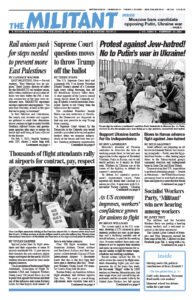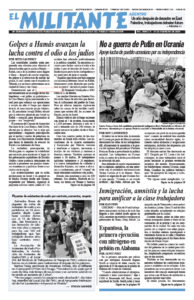The U.S. Supreme Court held oral arguments Feb. 8 on former President Donald Trump’s appeal of a Colorado high court ruling throwing him off the Republican primary ballot there. A clear majority of the justices voiced strong doubts about the Colorado ruling. If upheld, it would embolden Democrats’ moves to bar Trump from the ballot across the country.
Not confident President Joseph Biden can win reelection in November, the Democrats are desperate to find any way possible to stop Trump from running.
A Supreme Court victory by the Democrats in the Colorado case would provide a precedent to be turned against workers when we organize independently of the bosses and their two parties. Daunting petitioning requirements are already imposed to try to prevent the Socialist Workers Party from getting on the ballot.
The Colorado court relied on Section 3 of the 14th Amendment to the Constitution, which bars former office holders who have “engaged in insurrection” from holding office. It was ratified in 1868 to bar ex-Confederate officers from taking office and using their position to overturn the conquests of the Second American Revolution that uprooted slavery.
Justice Brett Kavanaugh said the Colorado ruling undermined the franchise. The court should “think about the right of the people to elect candidates of their choice, of letting the people decide,” he said.
Liberal justices were equally skeptical about the ruling. Justice Elena Kagan questioned how a single state can rule against a presidential candidate’s eligibility.
“The whole point of the 14th Amendment was to restrict state power” to interfere with the right to vote, Chief Justice John Roberts said. It says that “states shall not abridge privilege of immunity, they won’t deprive people of property without due process, they won’t deny equal protection.” The Colorado ruling is “at war with the whole thrust of the 14th Amendment.”
Democrats attack free speech
In barring Trump from the ballot, the Colorado judges claimed his speech at a public rally Jan. 6, 2021, was not protected by the First Amendment because he “incited” the riot at the Capitol later that day.
Trump actually told supporters to keep their action peaceful and prepare to “fight like hell,” or “you’re not going to have a country anymore.” By making these words a “crime,” the judges set a precedent. Whenever a worker vows to “fight” attacks by the employers they could be accused of “incitement.”
Underlying Democrats’ assault on basic freedoms — and their growing hysteria about the coming elections — is their deep fear of the working class.
Trump must be disqualified from running, liberal professor Sean Wilentz says in an article in the Feb. 22 New York Review of Books, because a Trump victory would be “an ongoing coup d’état by a charismatic despot.”
To help rig the 2024 election for Biden, Department of Justice special counsel Jack Smith has filed a number of criminal charges against Trump, including one invoking the Espionage Act. This law was adopted in 1917, just before the Bolsheviks led workers to conquer power, making the world’s first socialist revolution in Russia and providing a powerful beacon to working people worldwide. Ever since, the Espionage Act has been used to target militant workers, opponents of Washington’s wars abroad and communists.
Democrats’ efforts to paint Trump as a threat to “national security” go back to 2016, when Hillary Clinton’s campaign cooked up the Trump-Russia-collusion hoax and President Barack Obama’s administration unleashed the FBI to spy on and disrupt Trump’s campaign.
Anti-working-class Espionage Act
Smith is attempting to frame up Trump for “espionage” over claims the former president improperly held onto classified documents after leaving office. On Feb. 6 Judge Aileen Cannon granted part of Trump’s request that Smith identify the names of his list of potential government witnesses. Smith had demanded they be kept secret, claiming they otherwise could face retaliation. Cannon’s ruling protects Trump’s constitutional right to confront the witnesses against him.
The fact that Smith’s charges are a part of the Democrats’ drive to hobble Trump’s campaign was underlined Feb. 8. In a widely expected decision, the Justice Department announced it was recommending no charges against Biden for the same “offense” — retaining confidential documents after he was no long vice president — that Smith accuses Trump of. Biden had taken dozens of such documents to his Delaware home and other locations.
In 2016, no charges were filed against Secretary of State Hillary Clinton, who kept thousands of secret documents on her personal server and then destroyed them to try to cover up what she had done.
As Biden’s poll numbers continue to fall, calls are growing in the liberal media for Democratic Party kingmakers to replace him. Whether they do so or don’t, their assaults on constitutional freedoms will continue unabated.
Leaders for the Democratic National Committee are pursuing their drive to bar candidates from the ballot who they fear will take votes from Biden. They filed a complaint against former Democrat Robert Kennedy Jr. with the Federal Election Commission Feb. 9, accusing his presidential campaign of violating campaign finance laws by spending $15 million to collect signatures to get on the ballot.
Fighting these attacks on basic freedoms is of vital interest to workers, regardless of who the rulers target.

